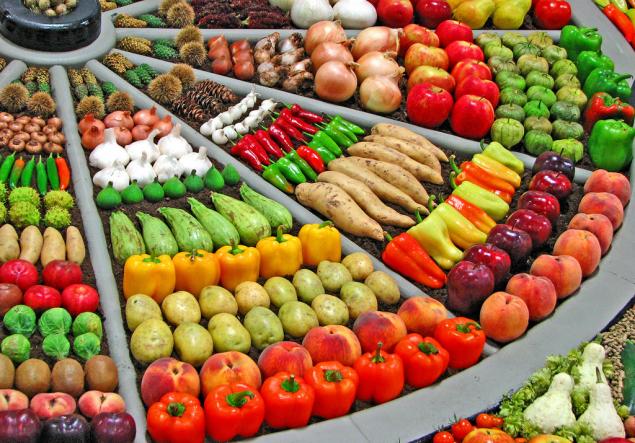654
About vegetarian diet among different peoples

Interesting! A short list of facts, recollections of witnesses, selected from a variety of sources on a vegetarian diet among different peoples. Continued. Enjoy :)
JAPAN. "The Japanese are not only abstain from eating meat, but even from the milk and dairy products. Do not kill and do not have anything broken - one of the laws of their religion, and they strictly adhere to it. The main food they serve: leguminous plants, fruits, roots, herbs and, mainly, rice; they have excellent quality and it grows in abundance. Japanese rice is prepared in various ways and give him such a variety of taste, color and aroma, that a foreigner could hardly guess what he ate. " (Mod. Univ. Hist., And Smith. Fruits and Farinacea.).
"Sweet potatoes, potatoes, turnips, carrots, pumpkin, tomatoes and snow peas are growing well, but all of these vegetables occupies an important place in the national table But beans make here an important food product, are prepared toffee - a real cheese made from beans;. He . great use among the poor Excellent radish grows here - some species it is very large, so too ... The Japanese eat a beet, in addition, young bamboo stems and prepared sauces and seasonings from different fungi ...
Because rice flour cakes and cookies made of various types of ... Oranges, peaches, pears, apricots, plums, raspberries, mulberries, currants and others. They grow in Japan as a natural local fruits; of the lands of garden plants - apples and strawberries ... Due to climate humidity, vegetation constantly maintains a bright green color and develops luxury "... (" New Iork World ", 1877.)
TURKEY. "In my last trip to Constantinople, I noticed that local boaters and paddlers in Caique, which can be counted among the best rowers in the world, do not drink anything other than water, and in the hot summer months, drink a lot. Constantinople boaters and water-carriers, in my opinion, ranks first among the physical development of the Europeans, and they all drink the same water, only occasionally allowing himself to eat sorbet. they feed on. mainly bread and some cucumbers, cherries, figs, dates, mulberries and other fruits, which are abundant in this region. Sometimes they complement the food small amount of fish. " (One and All, and "Dietetic Reformeru 1880.)
"Since the invasion of his own in Europe, the Turks did not stop to prove their vitality and energy. None of the European nations can not be compared with that warlike tribe in the quenched and endurance, Turks are able to live and fight, staying on a diet in which the soldiers of other nationalities would peremerli hunger. Blooming Turkish health, which they owe their simple habits, abstinence from intoxicating drinks and vegetarian food, allowing them to endure the hardest labor in the most simple and extremely moderate food ". (" Standard ", 1877.)
"Some of the wonderful Turkish excavators skillfully threw the sand, throwing it to twelve feet high. They were content samoyu simple food: their dinner and breakfast consisted of bread with a small amount of salted fish or olives, raisins and other fruits and abundantly washed down with water. Dinner was plentiful: it is often added on to the goodies, like thistle soup, boiled stems of this plant, the soup of alfalfa, dandelion and other field grasses. (Discoveries at Ephesus, by F. T. Wood, F. S. A., 1877.)
CHINA. "Nowhere culinary art is not brought to such perfection in Buddhist monasteries, although the food is made from the most basic supplies. Monks are not allowed to eat no meat, fish, or fowl; in foods they do not even include eggs, butter and milk meat in Lent. Valid only vegetable product. However, the monastery dinners differ a surprising variety of dishes. A foreign visitor, judging by appearances, might think worthy rector transgress the strict monastic rules and, despite a vow does not abandon the most heretical of meat dishes. " (R. H. Cobbold, M. A., Pictures of the Chinese.)
PALESTINE. "The food artisans and workers in Damascus consists of fruits, vegetables, rice, oils and bread ... As Christians and Mohammedans - vegans. Their food is the most primitive - pea or barley bread with fruits and vegetables. " (Official information from the Consulate.)
"Fellahs, the present inhabitants of Canaan, use the most simple food and rarely eat meat; they eat unleavened bread, dipping it in olive oil, like the poor widow of Sarepta; then go to eat rice, olives, Dibs (grape molasses), melted butter; and vegetables: pumpkin, melons, cucumbers and peas. With the shortage of these products they replace koberza- mallow leaves, fried in oil or boiled in milk. It is quite possible that the fellahs owe this simple food whiteness of their teeth, strong physique in the speed with which heal (S. R. Conder, R. E. Tentwork in Palestine, 1878.) their wounds. "
RUSSIA. "My normal diet during the wanderings in North Russia were eggs, brown bread, milk and tea. When possible, this variety of menus potatoes. A favorite accessory of Russian cuisine: sauerkraut, cucumbers, kvass - a kind of beer is very weak; it is made from black bread. " (Dr. Makkensie Wallace. Russia.)
"The Russian people usually eats black rye bread and garlic ... I often had to hire Russian workers, and they worked 16 to 18 hours a day for 8 cents. Were they in the morning on the boat with a loaf of bread weighing about a pound, and with a bunch of garlic the size of a fist. This was all their food during 16 or 18 hour labor. They hit me with their force and promptness and found much more endurance in hard work than any of my men. Another of them was 80 years old, or even 90, yet they worked more than middle-aged people of my crew. When loading with a jack, iron and hemp on a ship, they showed amazing strength. However, they differed agility, liveliness and good humor: the work they sang. (Kapit. Howland of New Bedford, Mass.)
"The Russian peasant is content samoyu simple food. His usual food consists of pickles, cabbage, mushrooms and a loaf of black bread. Except for large cities meat, apparently, it is used very little. Even in places like Tula and Zaraysk not seen butchers. The main part of the food in those districts where we are now, make vegetables and milk. (Bremner. Excursions in the Interior of Russia.)
FRANCE. "This is a way of life of the French peasant families: the morning to eat soup that Cobden praised as the source of wealth of the French people. Making this dish is cheap. At 12 people take two handfuls of dried beans or peas, potatoes, and a little bit of fried ham to make the brew taste; all cooked in enough water. Then fill 12 Posudin peklevannogo thin slices of bread and poured them into the soup. Instead of eating soup sometimes boiled rice with a little milk. Not get enough soup, farmer finishes his breakfast with a piece of dried bread ... Dinner always begins with potatoes, followed by cakes of the dough, kneaded with water with the addition of eggs, salad or yogurt. Wine and meat are allowed only in the harvest season, when the heat and haymaking. At such a time for dinner is served a small piece of salt pork and a little wine, which is drunk with water. " (Hamerton. Bound my House. 1875.)
EGYPT. "Life needs fellah amazingly limited: he eats the bread and vegetable products, and drink the Nile water." "In Egypt, - says another writer - food agricultural and working population is made up of the same products, as well as in China: the fish - it is, however, serves as a seasoning and is considered a delicacy - and from plant materials, mainly from sieve wheat, millet or maize bread and cucumbers, watermelons, pumpkins, onions, beans, leeks, sheep peas, Lupin, lentils, dates, and so on. n. Most of these plants are consumed raw. "(Smith. Fruits and farinacea .) "it is impossible not to wonder the strength and health of the majority of Egyptian peasants and the hard work that they carry at their poor and simple food. Nile boatmen for the most part characterized by force and strong muscles; they are all day rowing, running hooks, dragging the barge and all the while consistently merry and sing with the most intensive work. " (Lane. Egypt.) "Egyptian Pahari eating wheat or maize bread from not sifted flour, lentils and other vegetable products, belong to one of the most beautiful tribes which I have ever seen". (Katherwood.)
< br> INDIA. "From the remotest times the Universal meat in India was rice; it still remains a common meat in almost all tropical Asia. However, in the southern Indian subcontinent, he is now less used than before; but it replaced the non-meat foods, and other meat plant called Raja »(Buckle. History of Civilisation). "The main means of food for the population of the Indian subcontinent is maize, and in the Deccan - Jowar and Bayram; rice remains in the exclusive use of only in Bengal and partly in begar equally on the lower reaches of the seaside around the entire peninsula. (Elphinstone. History of India.)
MEXICO. "Everywhere I've been, the usual food of the working population are thin cakes of pounded maize, already described by me called Tortilla; remarkable that, despite the abundance of livestock in many places, the traveler rarely produce meat in huts encountered on the way. Tortilla obmaslivayutsya in a kind of sauce, heavily seasoned with chilli. " (Lyon. Residence in Mexico, 1828.) "The Indians of New Ispashi usually live to a ripe old age. They usually monotonous, almost exclusively vegetable food of maize and cereals. "(Taylor. Selections from JBumboldt's Works on Mexico, 1824.)
CHILE. "The copper mines in central Chile miners usually raised twelve times a day for 80 yards height loads of ore, weighing 200 pounds. When you exit from the mine, they seem scared and tired, but after a short rest, again descend. Their food exclusively plant: for breakfast - figs with a few loaves of bread, for dinner - boiled beans for supper - porridge. " (Sir Francis Guides also Playfair and Darwin).
Rio Salado. "At Rio Salado, in South America, the Spaniards, coming back from the inner parts of the country to carry the goods by land, live exclusively on plant foods. They differ in strength and health; on the back, in green leather bags they carry cargo such incredible gravity that it saddled with them three or four of them: while they go as fast as few will even without any burden »(Smith Fruits and Farinacea..)
.
BRAZIL. Rio de Janeiro. Laguayra. "Brazilian slaves very strong and healthy people with vozderzhnymi habits. Their food consists of rice, fruits, semi-white bread and roots Farren. They do not back down in front of the hard work, worn on the head of enormous gravity and tested them for a whole mile without stopping. Often you can see how they are going to spend pariahs, quick step, under the sound of a bell, which is in the hands of a caretaker; each carries on his head a coffee bag weighing 180 pounds and did not seem to feel the severity of ... rare that these people were ill with fever or other diseases ... The slaves brought into the Rio de Janeiro of the Congo, contained in the plant foods. All this is well done six-footers, BOGATYRSKY folded and remarkably strong ... day laborers in Laguayre do not eat meat, yet it is extremely healthy and strong nation. One man shouldered his shoulders beef or pork barrel and brings to the customs jetty, and it stands on a hill with a steep ascent, the road is not available for the crews. The soldiers in this country also consume plant food and all the lads, as the selection. " (Graham. Lectures.).
CYPRUS. "It's amazing what results to produce a constant power supply beans and oat bread of the inhabitants of the monastery Troodi-yew, which rarely allow themselves meat. The current abbot of the monastery, a handsome 70-year old man, kept perfectly straight, like a man who has gone to military school, and not inferior in physical strength 50-year-old man. Younger monks produce the same pleasant impression: it's all healthy, active people; for them does not mean anything in the morning to walk on steep mountain trails in the Troodos and back for 12 miles, and in return they are in the form of recreation, work in their gardens. " (. Sir Samuel Baker Cyprus in 1879.) «The Cypriot population strictly adheres to the posts; for too-thirds of the year it is fed only bread and vegetable products and not consume not only milk, but even vegetable oil. If the home cooked food more than once a week, it is considered extravagance. In the meat and fish are seen as an extraordinary luxury. The people kind of healthy and hearty; apparently food fruits and herbs, which are abundant in the island, for it quite satisfactory. " ( "Standart".)
ARABIA. "Few Arabs surpass in longevity, strength and endurance, and yet they eat only dates but milk. Bedouin Arabs, for months at a see no other food. In the country, near Cape Guardafui and Berbera Somalis live in a time of war solely on the dairy food, and they spend half their lives in the war. " (Lieutenant SK Low. "Food. Journal" 1873.)
BOLIVIA. "Soldiers here rations consist of maize and cocoa with water. Soldiers are famous for their amazing power. With luggage on their backs, they are on the 18, 20 and 25 miles a day without difficulty. " (Panama Star and Herald.)
ITALY. "Local farmers represent a great, courageous race; They feed almost exclusively on cookies and soup of ground chestnuts with a small amount of wheat bread and, at certain times of the year, Indian bread. Win this part of Italy is not rich, and in the last two years, the total need, few families can afford any beverage other than water. " (Private letter from Lucca.)
CEYLON. "Ordinary food naseleniya- rice with salt, the main seasoning in the East, and some other vegetable dishes with lemon juice and pepper - this is an abundant lunch ... Frugality in the table is not considered cost shame." (Pridham. Ceylon. 1849.)
Tiana Fialkova























